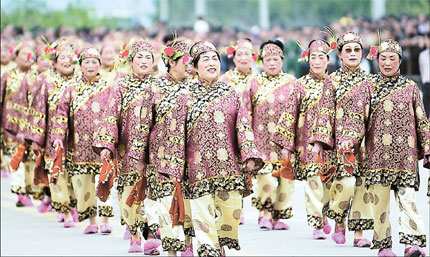Aunty matchmakers - 'Make me a perfect catch'
Matchmaking is an ancient profession and online matchmaking and mate-finding services abound today. But many no-nonsense aunty matchmakers (meipo) are still putting people together. Yao Minji delves into matchmaking - and emerges (still single) to tell us about it.
Li Meihua meets a reporter in a small dim-sum eatery on Tianshan Road and gets down to business. She has no time for pleasantries. The 68-year-old auntie doesn't even introduce herself before she fires off questions at prospective quarry.
 |
|
Women are dressed like a typical meipo in old China - wearing colorful clothes and exaggerated makeup, and having a large mole above the mouth in a parade to showcase the tradition of Chinese wedding ceremonies in this file photo. [Shanghai Daily] |
"Are you married?"
"Do you have a boyfriend?"
"Do you have an apartment? Where is it? How large is it? Which floor is it?"
"What do your parents do?"
"Is your company in the public sector or corporate?"
The retired civil servant has developed this rapid-fire method of information gathering from her hobby, her real passion, as a matchmaker, or meipo - mei means matchmaking and po refers to an old woman. She's been at it for 30 years.
In ancient times meipo was an important woman's profession. Today's movies set in the old days show typical meipo characters as women in their fifties or sixties, wearing colorful clothes, with exaggerated make-up and red mouths. Most importantly, they have a large mole above the mouth (ideally on the right, but either side is okay).
People with moles above their mouth are said to be great talkers, they can talk black into white and would make great lawyers - or matchmakers.
The mole is so much a part of the character that it's known as meipozhi, or woman matchmaker's mole.
The earliest record about matchmakers can be found in "Book of Songs," written as early as 1,000 BC.
Auntie matchmakers advise: This is for marriage, not for love
In ancient times, people's lives were limited to their own families and in most cases people knew very little even about their next-door neighbors. They didn't know which family had a marriageable daughter or son, their age, looks, inherited wealth and prospects. This is where the meipo steps in.
These women, determined networkers, are often familiar with the basic information about each family in the area. Many were midwives, healers, tailors, flower sellers or had other jobs that put them in contact with many people. Midwives, of course, knew all the birthdates.
Gradually, having a matchmaker became tradition and a must in ancient China. There's an old saying that legitimate marriage needs "words from parents and speeches from matchmakers." Those who don't receive the proper words are considered siben, or elopers, and deemed not to have a legitimate marriage.
Parents go to the meipo when their children reach the appropriate age and meipo will match names on her list according to their requirements. Usually, they match people from families of similar social class and education background. The meipo also takes the birthdates of the man and the woman to a fortune teller to predict how harmonious the combination would be.
In those days, it was believed that a woman without a matchmaker must be ugly and have no good qualities. Only the worst men would marry such women. It is quite the opposite today.
Back to the dim-sum encounter with our matchmaker, auntie Li.
"Usually, it is the parents who come to me because their children are too ashamed to be known to be going to a matchmaker," says Li who started putting couples together 30 years ago.
She is only one among the dozens of passionate aunties, all amateurs, who devote their free time to mahjong and matchmaking in the city. No one really knows how many there are, though there are many matchmaking services.
These aunties trade gossip about families over mahjong and consider it a great pleasure to help realize a marriage.
They have qualities in common. They are passionate about matchmaking, it's a labor of love. Although it's a tradition to give presents and red envelopes (cash) to meipo at wedding, these aunties mainly do it out of pleasure.
They are confident and skillful at extracting all the information they want from a person, and are sometimes quite demanding. It's difficult for young people, many of them shy and sheltered, to refuse to answer the questions. No one wants to be impolite.
Five matchmakers were interviewed for this article, and they all asked the same series of questions - all at a fast clip.
Each auntie of them has a list of men and women, usually containing the basic information - height, profession, monthly income, parents' jobs, apartment and its value, and several pictures. They don't ask about hobbies and interests, goals and values.
Despite their ages, these aunties are sharp and have committed all the information to memory. They rattle it off. Give them such-and-such requirements, and they'll quickly pull out a few names off the top of their head.
Auntie Li was general manager of a government-owned guest house in Fengxian District and had a lot of free time even before she retired. She has always been eager to make friends, so naturally she started putting young men and women from her networks together.
 0
0 







Go to Forum >>0 Comments